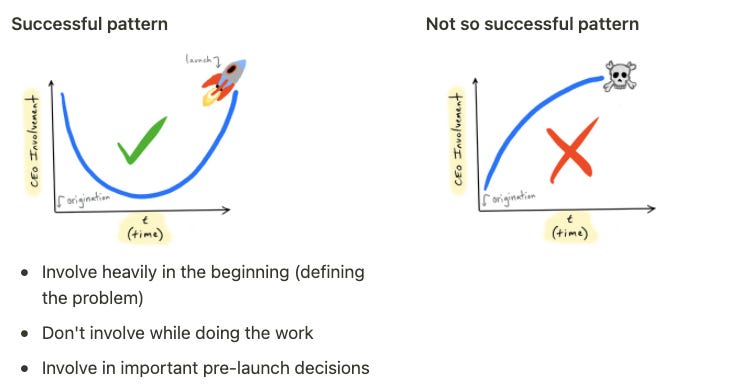What's the best way to kick off a new project?
It’s something all PMs want to get right. You are constantly kicking off new projects, but are you getting it in the best way possible? Lots of execution problems originate from the project setup.
Screwing up your kick-offs will not directly end your career, but failing the get it right can do serious harm. So how can we get them right? Let's dive in!
TLDR: Set your team up for success by starting projects right:
Put real effort into your kick-off. This is a high-impact moment for PMs.
Define and then reduce the scope. The smaller the building blocks, the better.
Define clear timelines, milestones, and cadence.
Make sure you involve leadership in the right way.
🤷 Why is nailing the project kick-off important?
The start of a project is a moment where a PM can have a big impact. It's your chance to create a shared understanding of the problem you are trying to solve. It's a chance to give your team clarity on the plan of attack. And it's a chance to motivate your team. Do this well and execution becomes much simpler. Fail to do this well and deal with a confused team, angry stakeholders, and projects that drag on forever without results.
😓 What makes it hard?
At the outset, problems are still fuzzy and the solution unclear. People have different levels of knowledge. And your team and stakeholders might not even agree it's a problem worth solving. If that's the case, they will not feel particularly responsible for the project.
🎯 How can you get it right?
There is no magic to nail every single project, but we found that doing the following increases our chances of success dramatically.
Build understanding and ownership It's crucial your team and stakeholders understand the problem and feel that it is important to solve. This requires a clear project brief detailing the problem from your side. This is only the beginning. Make room for discussion where knowledge can be exchanged. Another powerful tool you have at your disposal is experiencing the problem yourself. Have your team and stakeholders go through the painful experience you aim to solve. Make sure to document these new inputs and discussion points for later reference.
Define and reduce the scope As a PM, focus is probably the only superpower you can give to your team. To achieve that you need to make sure the scope (what is included in the project) is extremely clear. Also, you should define what is not in the scope. You also want to make this scope as small as possible. This will reduce complexity and uncertainty and speed up the feedback loop.
💭 When you think you reduced your project to the bare minimum, take out one more thing. As Elon Musk says: If you never add things back in later, you are not simplifying enough:
Set up milestones and build cadence Having a rhythm is a crucial factor in driving projects forwards. People are group animals and they will be much more likely to keep promises to others than to themselves. Set up that weekly meeting with clear to-do's. The smoother the team works together, the higher this cadence can become.
💭 Note: This doesn't have to be in-person meetings. It can also be a weekly/daily update shared asynchronously.
Ensure the right level of leadership involvement As a PM, you don't have authority and might lack the complete picture of the business. Therefore, to achieve success you need to get your leadership involved. Generally, they want to know what is going and help with an important decision, but not have the feeling that they need to do all the work
As said before not every project is the same. Do not try to find a one-size-fits-all approach. But try to be deliberate about your project kick-offs and tick these 4 boxes. It will make execution much easier. Good luck!
Here are some tools that can help you to kick off new projects.
Project template This template helps to define the scope and main workstreams. It also links it to concrete timelines. It's one I often used at Picnic.
Pre-mortem template This template helps you surface the main risks of a project, and plan accordingly. Also a simpler one here.
Hypothesis Issue Tree This template helps you break down the big complex projects into verifiable hypotheses
Amazon 6-pager This template helps you work backward from your end goal, which helps with defining the right scope and getting buy-in from your team and stakeholders
🤖 Internet things I enjoyed
Packy's brilliant and optimistic piece on how we might be living through a new renaissance period







